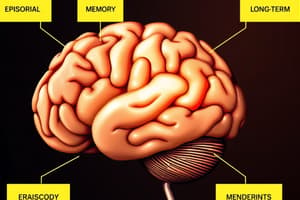Podcast
Questions and Answers
Which of the following is NOT a characteristic of long-term memory (LTM)?
Which of the following is NOT a characteristic of long-term memory (LTM)?
- It is responsible for immediate recall of sensory information. (correct)
- It covers a vast span of time.
- It can store information from a few seconds ago to our earliest memories.
- It is used for storing information about past events and knowledge.
Long-term memory can be divided into only two categories: declarative memory and implicit memory.
Long-term memory can be divided into only two categories: declarative memory and implicit memory.
True (A)
What is the primary function of long-term memory?
What is the primary function of long-term memory?
Long-term memory serves as an archive for storing information about past experiences and learned knowledge.
The process of transferring information from short-term memory to long-term memory is known as ______.
The process of transferring information from short-term memory to long-term memory is known as ______.
Match the following memory types to their corresponding descriptions:
Match the following memory types to their corresponding descriptions:
What is the process called that involves placing information into long-term memory?
What is the process called that involves placing information into long-term memory?
Maintenance rehearsal is a more effective way to transfer information into LTM compared to elaborative rehearsal.
Maintenance rehearsal is a more effective way to transfer information into LTM compared to elaborative rehearsal.
What are two main ways to encode information into long-term memory?
What are two main ways to encode information into long-term memory?
The process of connecting new material to information or ideas already in the learner's mind is called ______ rehearsal.
The process of connecting new material to information or ideas already in the learner's mind is called ______ rehearsal.
Match the following types of rehearsal with their definitions:
Match the following types of rehearsal with their definitions:
According to the levels of processing theory, deeper processing leads to better memory retention.
According to the levels of processing theory, deeper processing leads to better memory retention.
Which of these examples best illustrates elaborative rehearsal?
Which of these examples best illustrates elaborative rehearsal?
Explain how levels of processing theory relates to the effectiveness of memory storage.
Explain how levels of processing theory relates to the effectiveness of memory storage.
Which of the following is NOT a way to improve memory storage in LTM?
Which of the following is NOT a way to improve memory storage in LTM?
The self-reference effect suggests that we are more likely to remember information if we can relate it to our own experiences
The self-reference effect suggests that we are more likely to remember information if we can relate it to our own experiences
What is the name of the patient who had surgery that removed parts of their hippocampus, resulting in significant memory impairments?
What is the name of the patient who had surgery that removed parts of their hippocampus, resulting in significant memory impairments?
The ______ is a brain structure that plays a crucial role in the formation and consolidation of new memories.
The ______ is a brain structure that plays a crucial role in the formation and consolidation of new memories.
Match the memory storage mechanisms with their descriptions:
Match the memory storage mechanisms with their descriptions:
What is an example of a real-world application of organizing information for better recall?
What is an example of a real-world application of organizing information for better recall?
Traumatic accidents can result in memory impairments due to damage to the hippocampus.
Traumatic accidents can result in memory impairments due to damage to the hippocampus.
Explain how the self-reference effect can help improve memory storage in LTM.
Explain how the self-reference effect can help improve memory storage in LTM.
Which of the following is NOT a characteristic of deep processing according to the Levels of Processing theory?
Which of the following is NOT a characteristic of deep processing according to the Levels of Processing theory?
Shallow processing is more effective for encoding information into long-term memory.
Shallow processing is more effective for encoding information into long-term memory.
Give one example of how elaborative rehearsal can be used to encode information into long-term memory.
Give one example of how elaborative rehearsal can be used to encode information into long-term memory.
The more connections that are made between a piece of information and other information, the ______ the memory of that information will be.
The more connections that are made between a piece of information and other information, the ______ the memory of that information will be.
Match the following types of processing with their corresponding examples.
Match the following types of processing with their corresponding examples.
Imagery can enhance encoding and create stronger connections in memory.
Imagery can enhance encoding and create stronger connections in memory.
Which of the following is an example of a complex sentence that would be better for remembering the word 'chicken'?
Which of the following is an example of a complex sentence that would be better for remembering the word 'chicken'?
Explain how the Levels of Processing theory explains why complex sentences are better for remembering information.
Explain how the Levels of Processing theory explains why complex sentences are better for remembering information.
What type of memory did H.M. lose after his surgery?
What type of memory did H.M. lose after his surgery?
The hippocampus is responsible for storing long-term memories.
The hippocampus is responsible for storing long-term memories.
What is the term for the period of time needed to strengthen neural information in long-term memory?
What is the term for the period of time needed to strengthen neural information in long-term memory?
While H.M. lost his ability to form new conscious memories, he was still able to learn new ______.
While H.M. lost his ability to form new conscious memories, he was still able to learn new ______.
Match the following memory concepts to their corresponding descriptions:
Match the following memory concepts to their corresponding descriptions:
Which of the following was NOT a consequence of H.M.'s surgery?
Which of the following was NOT a consequence of H.M.'s surgery?
The hippocampus is necessary for short-term memory and working memory.
The hippocampus is necessary for short-term memory and working memory.
What is an example of a skill that H.M. could still learn despite his memory impairment?
What is an example of a skill that H.M. could still learn despite his memory impairment?
Which of the following is NOT a way of transferring information from short-term memory to long-term memory?
Which of the following is NOT a way of transferring information from short-term memory to long-term memory?
Implicit memory is associated with conscious recall, whereas declarative memory is associated with unconscious recall.
Implicit memory is associated with conscious recall, whereas declarative memory is associated with unconscious recall.
What is the name of the process that involves recovering information from long-term memory?
What is the name of the process that involves recovering information from long-term memory?
The case of HM demonstrates that the ______ plays a critical role in storing new information in long-term memory.
The case of HM demonstrates that the ______ plays a critical role in storing new information in long-term memory.
Match the following types of memory with their corresponding examples:
Match the following types of memory with their corresponding examples:
Flashcards
Long-Term Memory (LTM)
Long-Term Memory (LTM)
An archive of information about past events and knowledge learned.
Types of LTM
Types of LTM
LTM can be divided into declarative (explicit) and implicit memory.
Declarative Memory
Declarative Memory
A type of LTM that includes facts and experiences we can consciously recall.
Implicit Memory
Implicit Memory
Signup and view all the flashcards
Encoding to LTM
Encoding to LTM
Signup and view all the flashcards
Self-Reference Effect
Self-Reference Effect
Signup and view all the flashcards
Organizing Information
Organizing Information
Signup and view all the flashcards
Semantic Networks
Semantic Networks
Signup and view all the flashcards
Concept Maps
Concept Maps
Signup and view all the flashcards
LTM Storage Mechanisms
LTM Storage Mechanisms
Signup and view all the flashcards
Hippocampus Role
Hippocampus Role
Signup and view all the flashcards
Memory Loss Causes
Memory Loss Causes
Signup and view all the flashcards
Short-Term to Long-Term
Short-Term to Long-Term
Signup and view all the flashcards
Levels of Processing Theory
Levels of Processing Theory
Signup and view all the flashcards
Shallow Processing
Shallow Processing
Signup and view all the flashcards
Deep Processing
Deep Processing
Signup and view all the flashcards
Connections with Other Information
Connections with Other Information
Signup and view all the flashcards
Maintenance Rehearsal
Maintenance Rehearsal
Signup and view all the flashcards
Elaborative Rehearsal
Elaborative Rehearsal
Signup and view all the flashcards
Imagery Enhances Encoding
Imagery Enhances Encoding
Signup and view all the flashcards
Complex Sentences for Memory
Complex Sentences for Memory
Signup and view all the flashcards
Encoding
Encoding
Signup and view all the flashcards
STM to LTM transfer
STM to LTM transfer
Signup and view all the flashcards
Rehearsal
Rehearsal
Signup and view all the flashcards
Effective Encoding
Effective Encoding
Signup and view all the flashcards
Retrieval Cues
Retrieval Cues
Signup and view all the flashcards
Hippocampus Function
Hippocampus Function
Signup and view all the flashcards
Severe Memory Loss
Severe Memory Loss
Signup and view all the flashcards
Declarative vs. Implicit Memory
Declarative vs. Implicit Memory
Signup and view all the flashcards
Retrograde Amnesia
Retrograde Amnesia
Signup and view all the flashcards
Memory Consolidation
Memory Consolidation
Signup and view all the flashcards
Short-term Memory vs. Long-term Memory
Short-term Memory vs. Long-term Memory
Signup and view all the flashcards
Study Notes
Long Term Memory (LTM)
- LTM is an archive of past events and learned knowledge
- Covers a vast timeframe
- Examples: What you ate for dinner, activities on your birthday, favourite teachers
Different Types of LTM
- Declarative (conscious) memory:
- Episodic: Personal experiences and events with time associated
- Semantic: Facts, knowledge, not tied to personal experiences
- Implicit (non-declarative) memory:
- Past experiences subtly affect behaviour, unaware of these influences
- Priming: Previous stimuli affect responses to subsequent similar stimuli
- Procedural: Memory for skills and actions (e.g., riding a bike, tying shoes)
How STM Becomes LTM (Encoding)
- Rehearsal: Repeating information to oneself
- Maintenance rehearsal: Repeating without understanding (less effective)
- Elaborative rehearsal: Connecting new information to existing knowledge
- Levels of processing: Deeper processing leads to stronger memories
- Shallow: Focus on physical features
- Deep: Focus on meaning and connections
- Making connections: Forming links between new and existing information
- Organization: Structuring information into a meaningful framework
- Imagery: Creating mental pictures strengthens memory
How Memories are Stored in the Brain
- Learning and memory involve synaptic changes
- LTM storage occurs at synapses (junctions between neurons)
- Experience alters neural pathways
Losing Memories
- Traumatic accident: Disrupts memory consolidation (e.g., retrograde amnesia)
- Brain damage (e.g., patient H.M.): Affects formation of new conscious (declarative) memories
Retrieving Memories (Retrieval)
- Retrieval cues: Signals that trigger memories (e.g., sounds, places, moods)
- Transfer-appropriate processing: Retrieval is better if the learning and retrieval contexts are similar
- Encoding specificity: Memory retrieval is improved when the retrieval conditions match the conditions during learning (e.g., place, mood)
- State-dependent learning: Memory retrieval is enhanced when the internal state (e.g., mood) at encoding matches the retrieval state
- Matching place and mood: Studies show improved memory when testing occurs under similar circumstances to learning.
Tips for Effective Studying
- Elaboration: Questioning and answering about material
- Organization: Structuring information
- Association: Linking new information to existing knowledge
- Breaks: Studying in shorter sessions
- Matching learning/testing conditions: Replication of studying environment assists in retrieval
Studying That Suits You
Use AI to generate personalized quizzes and flashcards to suit your learning preferences.




